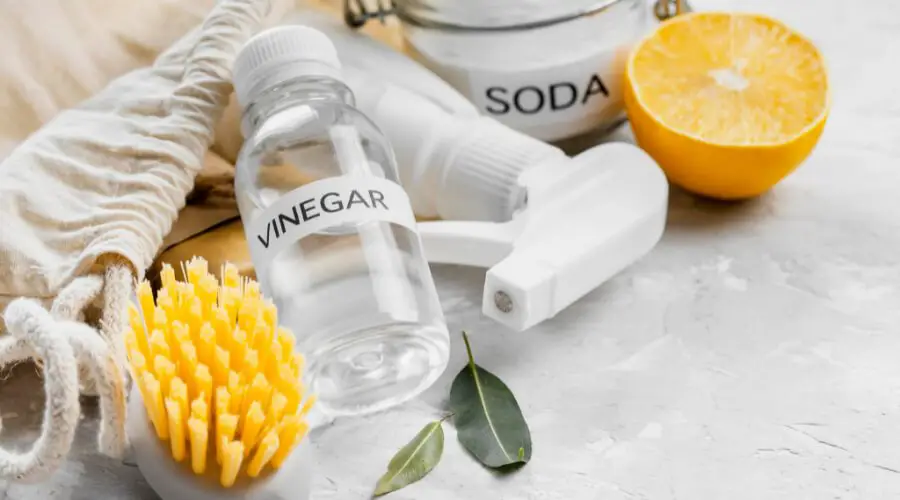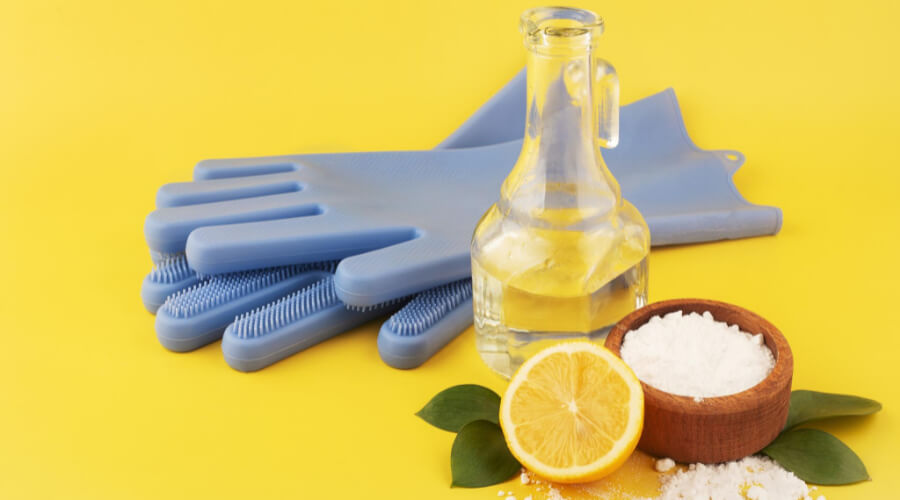Last Updated on July 22, 2023 By Emma W. Thomas
The duration of the vinegar smell varies based on ventilation, surface absorbency, and vinegar concentration. It can last from a few hours to a couple of days. Adequate ventilation, using absorbents like baking soda or citrus, and cleaning can help reduce the smell.
Factors Affecting Duration of Vinegar Smell
| Factors Affecting Duration of Vinegar Smell | Approximate Duration |
|---|---|
| Ventilation | Few hours to 1 day |
| Surface Absorbency | 1 day to 2 days |
| Vinegar Concentration | Few hours to 1 day |
| Use of Absorbents (e.g., baking soda) | Few hours to 1 day |
| Use of Citrus (e.g., lemon peels) | Few hours to 1 day |
| Air Purification | Few hours to 1 day |
| Cleaning Surfaces | Few hours to 1 day |
How Can You Mask Or Get Rid Of The Vinegar Smell After Cleaning?

Some people may not like the smell of vinegar and won’t be patient enough to wait for it to dissipate on its own. The following methods can help to mask or get rid of this odor fast;
Mix It With Water
One of the easiest ways of minimizing the smell of vinegar is to dilute it with enough water before using it. You can mix equal portions of water and vinegar in a spray bottle and spray it on the surface that you want to clean. Diluting the solution will not affect its cleaning abilities, but it will make it leave less smell.
Mix Vinegar With Lovely Smelling Herbs
You may also eliminate the strong smell by adding some herbs like rosemary or lavender to the mixture of water and vinegar. These herbs have a solid but pleasant scent which helps to mask the vinegar smell making it usable by most people.
Sprinkle Some Baking Soda
Baking soda is an excellent remedy for absorbing smells, including that of vinegar. You can apply this product on any surface that you clean with vinegar, leave it to sit for a few minutes, then wipe it using a sponge. You will then need to rinse with clean water, and the smell will be gone.
Use Of Fresh Lemon
Fresh lemon also comes in handy in removing the vinegar smell after using it to clean your kitchen and other surfaces. You can squeeze some fresh lemons (about two) in a spray bottle, mix it with two cups of water, spray the mixture on the surface you cleaned with vinegar, and leave it to dry.
You may also add half a lemon to the vinegar mixture and water in a bowl before using it. When you add lemon before using the vinegar solution, it will have the same effect as sweet-smelling herbs to neutralize the smell.
Allowing Air-Circulation
One of the quickest ways to remove the vinegar smell from your home is by allowing adequate circulation of air. While this method may not always work due to the prevailing weather condition, you can open all windows and doors. You can also turn on the dehumidifier or air conditioner if you have them.
Why Is Vinegar A Better Cleaning Solution Despite Its Pungent Smell?
Vinegar has acidic solid properties that make it among the best household cleaners. It is also a mild cleaner making it safe for many people since it consists of 95% water and 5% acetic acid. The following are some of the reasons for using vinegar;
It Is Eco-Friendly
Vinegar tops the list of environmental-friendly cleaning solutions. Unlike other commercial cleaners, this product does not have harsh chemicals, and it decomposes naturally in the environment.
Suitable For Different Functions
Unlike other cleaning products, vinegar is versatile, and you can use it to kill germs, destroy mold, remove grime and grease. You can also use vinegar to remove old adhesive stickers and soften gunk buildup which children put around your home.
Vinegar is also suitable for removing your pet’s mess, like urine and smell, from your carpet or couch. You can use this substance to mask the scent, thereby preventing your pet from using the same spot repeatedly.
It Does Not Contain Harsh Chemicals.
Vinegar is very mild and does not contain any harsh chemicals which can compromise your health. This product can clear away soap scum and other dirt due to its acidic properties without harming you.
Vinegar Is Readily Available And Inexpensive.
You can readily get vinegar from your local supermarkets, and it is also inexpensive. Its affordability and availability make vinegar a better choice than other cleaning products.
Are There Any Drawbacks Of Using Vinegar?

Although vinegar has several advantages when compared to commercial cleaners, it has some drawbacks, including;
You Cannot Use It As A Disinfectant Or Sanitizer.
Vinegar is not registered by the EPA as a sanitizer or disinfectant and cannot be used to kill germs or viruses that cause flu and colds. Using vinegar can leave behind most germs and bacteria that can cause sicknesses. If the purpose of your cleaning is to kill 99.9% of germs and protect your family from infections, then you can opt for a disinfectant or sanitizer.
You Cannot Use Vinegar In High Concentrations.
Since vinegar consists of acetic acid, you need to be careful about the concentrations. When used in high concentrations, vinegar can irritate the eyes, stomach, or eye tissue. But, when you use it properly, this substance is safer than ammonia or bleach.
It Can Corrode Some Surfaces.
Vinegar cannot be used on stone surfaces such as limestone, granite, onyx, marble, or travertine. Using vinegar on these surfaces will etch and make them dull. To clean these materials, you can opt for natural cleaners like Force of Nature which cannot damage the sealed stone surfaces.
It Needs Thorough Rinsing.
Since cleaning surfaces with vinegar can corrode them, you need to rinse thoroughly with enough clean water. You may realize that your surfaces are damaged over time which can cause irreparable damage. You need to be cautious when cleaning dishwasher gaskets, window seals, and unsealed grout.
It Can Destroy Plants.
Due to the acidic nature of vinegar, using it near some plants can lead to stunted growth or even death. If you must use a cleaner near your plants, then go for Force of Nature.
It Has A Strong Smell.
Vinegar has an awful smell that can linger for a long. It may not be ideal to use this product around children or anyone asthmatic or allergic to smell. You may also need to open all the windows and doors when using vinegar, unlike other cleaners.
Pros and Cons of Using Vinegar as a Cleaning Solution
| Pros of Using Vinegar as a Cleaning Solution | Cons of Using Vinegar as a Cleaning Solution |
|---|---|
| 1. Eco-friendly and Non-toxic | 1. Strong Odor |
| 2. Effective Stain and Grease Remover | 2. Not Suitable for Some Surfaces |
| 3. Antibacterial Properties | 3. Can Damage Natural Stone and Marble |
| 4. Natural Deodorizer | 4. May Not Disinfect as Effectively as Chemical Cleaners |
| 5. Organic Weed Killer (for outdoor use) | 5. Does Not Kill All Types of Germs and Bacteria |
| 6. Fruit and Vegetable Wash | 6. Stains Certain Fabrics and Upholstery |
| 7. Fabric Softener | 7. Requires Additional Scrubbing for Tough Stains |
| 8. Streak-free Glass and Mirror Cleaner | |
| 9. Clogged Drain Cleaner | |
| 10. Freshens up Coffee Maker |
Conclusion
Although vinegar is an excellent cleaning solution, its smell can sometimes discourage you from using it. The smell will fade on its own, but it can take longer than you expect and linger in your home for some hours. But, you can get rid of the smell faster by opening your windows and doors to allow for air circulation. You may switch on the air conditioner or dehumidifier if any.
You can also mask the vinegar smell by using excellent-smelling herbs such as lavender or rosemary. Mix these herbs with vinegar and water before using them. You can also squeeze a lemon or two into the vinegar mixture to give your surfaces a fresh scent. Baking soda will also come in handy in absorbing the smell if you dislike it. Sprinkle some baking soda on the surfaces you are cleaning and allow it to sit for a few minutes before wiping it with a clean piece of cloth.
References:
https://www.homemadesimple.com/in-the-home/how-to-get-rid-of-vinegar-smell/
https://www.angi.com/articles/how-to-get-rid-vinegar-smell.htm
Emma is a graduate of Domestic Science or Family and Consumer Sciences (Home Economics) from the University of Wisconsin. She has 7 years of experience Working with the strategic section of BestBuy and now writing full-time for Homeeon.
From Managing the Home, Interiors, Cleaning, and Exteriors to Gardening and everything about Making A Home Liveable – is her passion and this Homeeon is the result of this.
Emma loves decorating her home with the best stuff found online. She cares about quality over anything and writes reviews about them here in Homeeon. Get in touch with her over Pinterest.
Keep reading her blogs.

